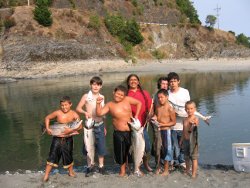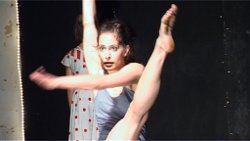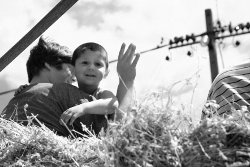Estonia/Norway/USA, 2008, 60 min
Liivo Niglas, Diane Perlov, Frode Storaas
30.01.2010 14:05
 The Klamath River of Oregon and California is one of the most important salmon runs in the United States. While diminished over the past 100 years, it still supports an abudance of life and diverse economies struggling over its future course. This is a film about the Indian tribes of the river ecosystem – what the Klamath means to them and how they draw on traditional and modern resources to restore its strenght, beauty and balance. The film focuses on the Klamath River and the Indian tribes of the lower basin – the Yurok, Hoopa and Karuk. Yet this story has implications for any number of river ecosystems and indigenous peoples around the world. Through the Indian tribes of the Lower Klamath, the film reminds us how the health of a people and the health of its lands are integrally linked.
The Klamath River of Oregon and California is one of the most important salmon runs in the United States. While diminished over the past 100 years, it still supports an abudance of life and diverse economies struggling over its future course. This is a film about the Indian tribes of the river ecosystem – what the Klamath means to them and how they draw on traditional and modern resources to restore its strenght, beauty and balance. The film focuses on the Klamath River and the Indian tribes of the lower basin – the Yurok, Hoopa and Karuk. Yet this story has implications for any number of river ecosystems and indigenous peoples around the world. Through the Indian tribes of the Lower Klamath, the film reminds us how the health of a people and the health of its lands are integrally linked.
Awards: Diploma, Matsalu International nature Film Festival, Estonsko 2009; Finalist, Kyoto University Museum Academic Film Competition, Japonsko 2009
Language of dialogues: English
Germany, 2009, 24 min
Claudia Goldberg
29.01.2010 21:15
 In Berlin, young self-employed workers live the alternative to a nine-to-five job – low rents and space for creative ideas are still available. A sewing café owner, a freelance journalist and two contemporary dancers give insights in theirs live styles and tell about their independent work. The protagonists are not only part of berlin´s creative class buut they also represent a part of well-educatted generation, who struggles between job insecurity and th wish of self-realization.
In Berlin, young self-employed workers live the alternative to a nine-to-five job – low rents and space for creative ideas are still available. A sewing café owner, a freelance journalist and two contemporary dancers give insights in theirs live styles and tell about their independent work. The protagonists are not only part of berlin´s creative class buut they also represent a part of well-educatted generation, who struggles between job insecurity and th wish of self-realization.
Language of dialogues: Deutsch
Language of subtitles: English
Česká republika, 2009, 37 min
Pavel Borecký
30.01.2010 17:00
 Documentary mosaic about Czech fellow-countrymen living in a small Serbien village. 90 years ago, family Frič desired a change. They left the rough life at mountainous Banat - the Southern promontory of Rumenien Karpats - and moved to more fertile lowlands stretching along impressive Danube. Soon the others followed.
Documentary mosaic about Czech fellow-countrymen living in a small Serbien village. 90 years ago, family Frič desired a change. They left the rough life at mountainous Banat - the Southern promontory of Rumenien Karpats - and moved to more fertile lowlands stretching along impressive Danube. Soon the others followed.
Nowadays, melody after melody is wafting from Írovič's orchard. Their son is practicing playing the harmonica. Next competition is coming soon. What does his talent mean for the Czech minority?
Gaya Czechs are the last compact social group which settled down at Serbien Banat. Eventhough they do not need to drag themselves way up the hills to reach their fields, they remind to be a minority in comparison with pure Czech Gernik.
How has this change in the course of decades influenced upcoming generations?
Language of dialogues: Czech
 The Klamath River of Oregon and California is one of the most important salmon runs in the United States. While diminished over the past 100 years, it still supports an abudance of life and diverse economies struggling over its future course. This is a film about the Indian tribes of the river ecosystem – what the Klamath means to them and how they draw on traditional and modern resources to restore its strenght, beauty and balance. The film focuses on the Klamath River and the Indian tribes of the lower basin – the Yurok, Hoopa and Karuk. Yet this story has implications for any number of river ecosystems and indigenous peoples around the world. Through the Indian tribes of the Lower Klamath, the film reminds us how the health of a people and the health of its lands are integrally linked.
The Klamath River of Oregon and California is one of the most important salmon runs in the United States. While diminished over the past 100 years, it still supports an abudance of life and diverse economies struggling over its future course. This is a film about the Indian tribes of the river ecosystem – what the Klamath means to them and how they draw on traditional and modern resources to restore its strenght, beauty and balance. The film focuses on the Klamath River and the Indian tribes of the lower basin – the Yurok, Hoopa and Karuk. Yet this story has implications for any number of river ecosystems and indigenous peoples around the world. Through the Indian tribes of the Lower Klamath, the film reminds us how the health of a people and the health of its lands are integrally linked.
 In Berlin, young self-employed workers live the alternative to a nine-to-five job – low rents and space for creative ideas are still available. A sewing café owner, a freelance journalist and two contemporary dancers give insights in theirs live styles and tell about their independent work. The protagonists are not only part of berlin´s creative class buut they also represent a part of well-educatted generation, who struggles between job insecurity and th wish of self-realization.
In Berlin, young self-employed workers live the alternative to a nine-to-five job – low rents and space for creative ideas are still available. A sewing café owner, a freelance journalist and two contemporary dancers give insights in theirs live styles and tell about their independent work. The protagonists are not only part of berlin´s creative class buut they also represent a part of well-educatted generation, who struggles between job insecurity and th wish of self-realization. Documentary mosaic about Czech fellow-countrymen living in a small Serbien village. 90 years ago, family Frič desired a change. They left the rough life at mountainous Banat - the Southern promontory of Rumenien Karpats - and moved to more fertile lowlands stretching along impressive Danube. Soon the others followed.
Documentary mosaic about Czech fellow-countrymen living in a small Serbien village. 90 years ago, family Frič desired a change. They left the rough life at mountainous Banat - the Southern promontory of Rumenien Karpats - and moved to more fertile lowlands stretching along impressive Danube. Soon the others followed.